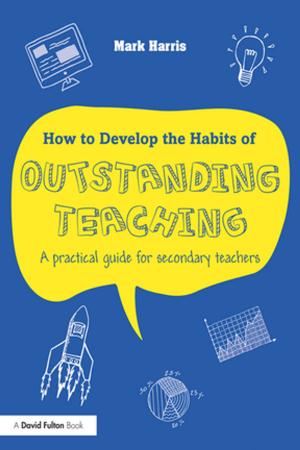Educating Learners with Down Syndrome
Research, theory, and practice with children and adolescents
Nonfiction, Reference & Language, Education & Teaching, Special Education, Educational Theory| Author: | ISBN: | 9781134673421 | |
| Publisher: | Taylor and Francis | Publication: | October 23, 2013 |
| Imprint: | Routledge | Language: | English |
| Author: | |
| ISBN: | 9781134673421 |
| Publisher: | Taylor and Francis |
| Publication: | October 23, 2013 |
| Imprint: | Routledge |
| Language: | English |
For individuals with Down syndrome, the extent of the effect of intellectual disability depends largely on the degree of provision of appropriate support and intervention. In Educating Learners with Down Syndrome, editors Rhonda Faragher and Barbara Clarke have brought together a number of expert contributors, whose chapters review recent findings in the field of DS education, highlight promising practices, and identify areas for future research.
While the emphasis is primarily on the school years, links to early intervention and to life post-16 are made, with chapters organized into three parts: conceptual overview of issues in learning and teaching, learning mathematics, and literacy development. The book is also united by the cohesive themes of assessment, evidence-based practice, and inclusive practices.
Educating Learners with Down Syndrome importantly incorporates the voices of individuals with Down syndrome, whose personal narratives add significance to the research mission of the text and demonstrate the authors' inclusive philosophy. Aimed at researchers, teacher educators, higher degree students, and policy makers, this book is the first of its kind to provide a compendium of research on educating learners with Down syndrome.
For individuals with Down syndrome, the extent of the effect of intellectual disability depends largely on the degree of provision of appropriate support and intervention. In Educating Learners with Down Syndrome, editors Rhonda Faragher and Barbara Clarke have brought together a number of expert contributors, whose chapters review recent findings in the field of DS education, highlight promising practices, and identify areas for future research.
While the emphasis is primarily on the school years, links to early intervention and to life post-16 are made, with chapters organized into three parts: conceptual overview of issues in learning and teaching, learning mathematics, and literacy development. The book is also united by the cohesive themes of assessment, evidence-based practice, and inclusive practices.
Educating Learners with Down Syndrome importantly incorporates the voices of individuals with Down syndrome, whose personal narratives add significance to the research mission of the text and demonstrate the authors' inclusive philosophy. Aimed at researchers, teacher educators, higher degree students, and policy makers, this book is the first of its kind to provide a compendium of research on educating learners with Down syndrome.















